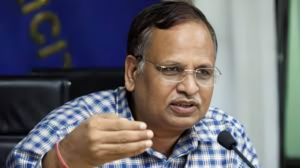Delhi Court Dismisses Corruption Case Against AAP’s Satyendar Jain in Major Political Setback
In a surprising turn of events, a Delhi court recently threw out a high-profile corruption case against senior Aam Aadmi Party leader Satyendar Jain. The decision has sent ripples across India’s political landscape, leaving supporters elated and critics stunned. In this article, we dive deep into what happened, why it matters, and how it could shape the future of anti-corruption efforts in the country.

Background of the Case
When the Enforcement Directorate first slapped charges of money laundering and corruption on Satyendar Jain, it grabbed headlines nationwide. Jain, who served as Delhi’s Health Minister, faced allegations that he had amassed wealth disproportionate to his known sources of income. Many journalists and observers called it a test of India’s commitment to fighting corruption at the highest levels.
Over months, the case dragged through procedural hurdles, remand hearings, and heated arguments.
- Key Allegations: Accused of hiding assets worth crores; claims of benami properties.
- Defence Stance: Jain’s lawyers argued investigators relied on weak witness statements and mismatched documents.
- Political Angle: AAP called it a politically motivated attack meant to derail the party’s governance in Delhi.
Small towns and big cities watched closely, as many Indians hoped for a clean, impartial probe into public servant misconduct.
Court’s Rationale for Dismissal
At the heart of the court’s ruling was a finding that the prosecution failed to prove crucial links between Jain and the alleged assets. In simple words, they could not show beyond reasonable doubt that those properties belonged to him or were bought with illicit money.
Law experts noted:
- Insufficient Evidence: Core documents were declared inconclusive.
- Witness Credibility Issues: Some witnesses turned hostile or couldn’t confirm details under oath.
- Procedural Lapses: Certain steps in property seizure and valuation were found invalid.
Because of these gaps, the judge felt bound to uphold principles of fair trial and ordered complete dismissal of the charge sheet.

Political and Social Impact
This dismissal is more than legal news—it’s a political earthquake. Here is why:
- Boost for AAP: Party cadres feel vindicated and see fresh momentum for upcoming state elections.
- Opposition Reaction: BJP leaders call the verdict “disappointing” and vow to pursue alternative legal routes.
- Public Trust: For many citizens, it raises questions about how corruption cases are built and prosecuted.
A real-life example helps illustrate: last year, when a similar case against another regional leader collapsed, voter trust dipped by 15% in that state’s local polls. Delhi’s scenario may repeat if people think anti-corruption bodies lack rigor.
Civil society groups now demand:
- Transparent review of investigative agency procedures.
- Stricter training for officials handling evidence.
- Public oversight panels to monitor big-ticket cases.
Lessons Learned
From this episode, we learn that justice depends on both strong evidence and strict adherence to procedure. Here are quick takeaways:
- Build rock-solid charge sheets: Skipping small steps can mean case collapse.
- Ensure witness reliability: Witnesses must be prepped and protected.
- Guard against politics: Agencies should maintain independence from ruling parties.
For students of law, this case will become a textbook example of why due process matters as much as the substance of allegations.
Conclusion
The Delhi court’s decision to dismiss corruption charges against Satyendar Jain underscores the delicate balance between fighting graft and ensuring fair trials. While AAP celebrates a major win, critics warn that public faith in anti-corruption mechanisms may waver. Going ahead, investigators and lawmakers must work together to strengthen legal frameworks—so that no genuine case falters on technical grounds, yet no innocent person suffers from political vendettas.
Ultimately, India’s battle against corruption must be fought with both zeal and precision, keeping the citizen’s trust intact.